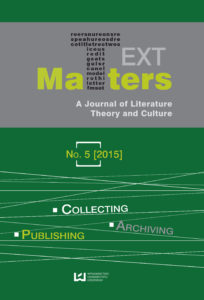Thoreau and Spadina Dreamers Unite: Idealistic Communities in Canadian Publishing
DOI:
https://doi.org/10.1515/texmat-2015-0005Abstract
The rise of Canadian national identity in the 1960s contributed to a flourishing small press movement across the country. One of the most impressive, long-standing and influential presses of this era was Coach House Press, located near the University of Toronto. Book design, creative forms of editing, collaborative and community-oriented work all became a focus of idealism in the Coach House context, as its founders borrowed from earlier international models, but relied, too, on the Canadian moment to devise new ways to disseminate and create literary culture. More recently, a similar idealistic model in publishing and press work has appeared in Nova Scotia at Kentville’s Gaspereau Press. Gaspereau’s founders, like those at Coach House, have searched for an alternative plan and method- through an in-house dedication to the craft of design and bookmaking- that is unlike that applied by mainstream publishers. One could argue that the two outfits represent a counter-tradition in Canadian cultural life, a dedication to artisanal work, as well as to forms of collaborative editing and design. With the publishing and bookselling industry under great pressure in Canada from shifts in technology and government support, counter-traditional models like Gaspereau Press present the possibility of unique forms of cultural output and marketing. Behind such efforts we recognize philosophies and notions of cultural community that run counter to major trends. This paper examines the history of both presses, specific publications, and the impact of such work on the broader Canadian literary scene.
Downloads
References
Barbour, Douglas. “Some Notes about a Long Relationship with the Coach House.” Open Letter 9.8 (1997): 16-22. Print.
Google Scholar
Bowering, George. Baseball. Toronto: Coach House, 1967. Print.
Google Scholar
Clifford, Wayne. Man in a Window. Toronto: Coach House, 1965. Print.
Google Scholar
Cohen, Matt. Typing: A Life in 26 Keys. Toronto: Vintage, 2001. Print.
Google Scholar
Davey, Frank. “The Beginnings of an End of Coach House Press.” Open Letter 9.8 (1997): 40-77. Print.
Google Scholar
Gaspereau Press Catalogue. www.gaspereau.com 2012. Web. 28 June 2014.
Google Scholar
Kiyooka, Roy. Nevertheless These Eyes. Toronto: Coach House, 1967. Print.
Google Scholar
Moulton, Donalee. “Embracing the Old: Book Printing on State of the Art Technology.” Canadian Printer 110.10 (2002): 13. Print.
Google Scholar
Reid, Dennis. “The Old Coach House Days.” Open Letter 9.8 (1997): 23-25. Print.
Google Scholar
Rosenberg, David. “Crossing the Border: A Coach House Memoir.” Open Letter 9.8 (1997): 9-15. Print.
Google Scholar
Steeves, Andrew. “The Right Kind of Crazy.” Books in Canada 33.2 (2004): 40-41. Print.
Google Scholar
Thoreau, Henry David. Walking: An Essay by Henry David Thoreau. Ed. Andrew Steeves. Kentville: Gaspereau, 2008. Print.
Google Scholar
Zweig, Stefan. The World of Yesterday. Trans. Harry Zohn. 1943. Lincoln: U of Nebraska P, 1964. Print.
Google Scholar
Downloads
Published
How to Cite
Issue
Section
License

This work is licensed under a Creative Commons Attribution-NonCommercial-NoDerivatives 4.0 International License.













